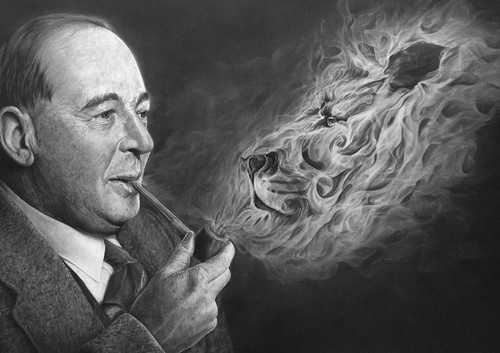Clive Staples Lewis biography
Narnia creator: Clive Staples Lewis
"Like his brilliant friend Tolkien, C. S. Lewis reinvented the very nature of fantasy, adding depth, beauty, and multidimensionality. His Chronicles of Narnia not only take one’s breath away and capture the heart with adventure – both for the young and the old – but they also reflect Lewis’s most heartfelt convictions on matters of faith and hope, good and evil, genuine wonders and wondrous truths. In our time, every creator of fantastic worlds should look to Narnia as a standard."
- Lloyd Alexander
C. S. Lewis, or Jack Lewis, as he preferred to be called, was born in Belfast, Ireland (now Northern Ireland), on November 29, 1898. He was the second son of Albert Lewis, a solicitor, and Flora Hamilton Lewis. Three years earlier, in 1895, his elder brother Warren Hamilton Lewis, better known as Warnie, had been born.
Early days
Lewis’s childhood was relatively happy and carefree. At that time, Northern Ireland had not yet been afflicted by bitter civil strife, and the Lewises enjoyed a good life. Their family home, called Little Lea, was a large gabled house with narrow passageways and an overgrown garden, which Warnie and Jack spent all their days exploring. There was also a library overflowing with books. Jack’s favorites were Treasure Island by Robert Louis Stevenson and The Secret Garden by Frances Hodgson Burnett.
A painful loss
This idyllic childhood ended when Lewis’s mother fell ill and died of cancer in 1908. Less than a month after her death, the boys were sent away from home to a boarding school in England.
Lewis hated the school because of its strict rules and its cruel, heartless headmaster, and he was desperately homesick for Belfast. Fortunately, the school was shut down in 1910, and he was able to return to Ireland.
However, a year later he was sent back to England for further studies. This time, things went far better. As a teenager, Lewis grew to love poetry, especially the works of Homer and Virgil. He also developed an interest in modern languages, learning to speak French, German, and Italian.
An Oxford Student
In 1916, Lewis was admitted to University College (founded in 1249) at Oxford. Since the Middle Ages, Oxford and Cambridge had been leading centers of learning. Yet almost immediately after enrolling, Lewis volunteered for military service in the First World War, fighting in the muddy trenches of northern France.
After the war ended in 1918, Lewis returned to Oxford, where he resumed his studies with great enthusiasm. In 1925, having graduated with honors in Greek and Latin Literature, Philosophy and Ancient History, and English Literature, Lewis obtained a prestigious teaching post in English at Magdalen College, also in Oxford. He remained in Oxford for 29 years, until 1955, when he was appointed Professor of Medieval and Renaissance Literature at Magdalen College, Cambridge.
Lewis and his books
In addition to his university duties, Lewis devoted himself to writing. His first major work was The Pilgrim’s Regress (1933), an account of his spiritual journey toward Christian faith. This was followed by many other works, which earned him recognition not only as a writer on religious themes, but also as an author of academic studies and popular fiction. The Allegory of Love (1936), still considered a masterpiece, explored love literature from the Middle Ages to the time of Shakespeare. Out of the Silent Planet (1938) became the first novel in his science-fiction trilogy, whose protagonist bore a distant resemblance to Lewis’s friend Tolkien, the author of the children’s classic The Hobbit.
Narnia
When Lewis first decided to write books for children, his publisher and some friends tried to dissuade him, fearing it would harm his reputation as a serious author. Tolkien in particular criticized Lewis’s first Narnia book, The Lion, the Witch and the Wardrobe. He thought it mixed too many elements – Father Christmas, an evil witch, talking animals, and children. Fortunately, Lewis ignored all such advice.Recognition at last
After the publication of The Lion, the Witch and the Wardrobe in 1950, Lewis quickly wrote six more Narnia books, releasing the final one, The Last Battle, in 1956. Although the initial reception was rather cool – both from critics and reviewers – the books soon became beloved by ordinary readers. Since then, The Chronicles of Narnia have sold more than 100 million copies worldwide and are among the most cherished works of children’s classic literature.
Last years
After finishing the Narnia series, Lewis continued to write on autobiographical and religious themes, though with much less financial success. His life during these years was overshadowed by the health problems of his wife, Joy Gresham, whom he had married in 1956; she died of cancer in 1960.
Following her death, Lewis’s health gradually declined, and in the summer of 1963 he retired from his university post. He died on November 22, 1963 – the same day President Kennedy was assassinated – a fact that caused his passing to be scarcely noticed at the time. Yet countless readers around the world still remember him and continue to be inspired by his books, passing that inspiration on to future generations.
In brief...
Clive Staples Lewis was born on November 29, 1898, in Belfast, the son of a solicitor. He showed an early interest in mythology and literature, encouraged and developed by W. T. Kirkpatrick, a tutor under whom Lewis studied privately from 1914 to 1917. In 1917 he entered Oxford University, but soon went to the front, was wounded at the Battle of Arras, and spent some time in hospital.
After recovering in 1919, he returned to Oxford, completed his studies, and for nearly thirty years taught English literature at Magdalen College. Together with his friends and colleagues J. R. R. Tolkien and Charles Williams, Lewis founded a literary group of university men who called themselves the Inklings. In 1954, Lewis moved to Cambridge, where he was given a chair and became a professor; in 1955 he was elected a Fellow of the British Academy.
As a scholar, he became known for his studies of medieval English literature; as a theologian, for works that presented Christianity from the perspective of one who had lost faith in childhood and returned to it in adulthood. His first literary publication was a collection of poetry, Spirits in Bondage (1919).
Lewis received honorary doctorates in literature from Laval University in Quebec (1952) and the University of Manchester (1959), and honorary degrees from the universities of Dijon (1962) and Lyon (1963). He was an honorary fellow of Magdalen College, Oxford (1955), and University College, Cambridge (1958). In 1937 he became a fellow of the publisher Victor Gollancz; in 1948, a member of the Royal Society of Literature; and in 1957, the recipient of the Carnegie Medal.
Clive Staples Lewis died on November 22, 1963.
Scholar, writer, poet, philologist, literary critic, and theologian. Interestingly, in his youth Lewis, though raised in a devout family, rejected Christianity, and “returned to Christ” only in adulthood.
Interesting facts
- Lewis spoke French and Italian, and some German, though he never tried to shed his strong English accent.
- He went abroad only twice: during World War I – to the front in France – and in 1960 with his wife, to Greece.
- Despite lecturing on the Renaissance, Lewis never wished to visit Italy.
- He could not type, writing everything by hand; usually his brother Warnie typed up his manuscripts.
- Warnie Lewis, a professional soldier, wanted to become a military historian and even wrote a little, but ended up serving almost entirely as secretary to his brother Jack. His writing was hampered by the querulous Mrs. Moore and his own alcoholism. He was, however, an extraordinarily kind man and a perfect gentleman. Both brothers were shy of women.
- Quotations from Lewis’s treatise The Four Loves appear in the speeches of Pope John Paul II, who told Walter Hooper that it was one of his favorite books.
- Lewis consciously became a Christian exactly two years after his father’s death.
- Apart from childhood, Lewis first took communion on Christmas 1931; his brother Warnie, unaware of this, received communion on the very same day in Shanghai.
- Lewis preferred tea to coffee, and red wine to white.


